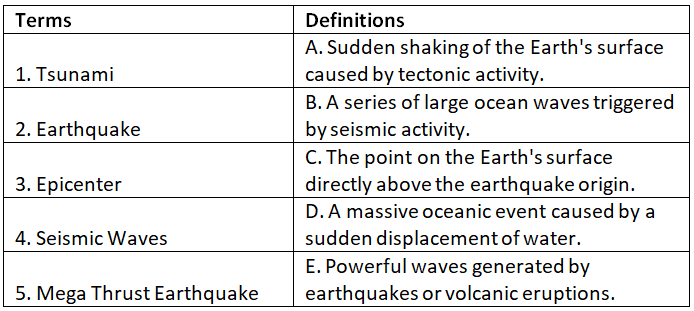Worksheet: How Tsunamis Work | General Knowledge Encyclopedia - Class 8 PDF Download
| Table of contents |

|
| Section A: Multiple Choice Questions (MCQs) |

|
| Section B: Short Questions |

|
| Section C: Fill in the Blanks |

|
| Section D: True or False |

|
| Section E: Match the Column |

|
Section A: Multiple Choice Questions (MCQs)
Q1: What causes a tsunami?
(a) Volcanic eruptions
(b) Earthquakes
(c) Hurricanes
(d) Tornadoes
Q2: Tsunamis are most commonly caused by underwater earthquakes along:
(a) The Atlantic Ocean
(b) The Indian Ocean
(c) The Pacific Ocean
(d) The Arctic Ocean
Q3: Which of the following statements about tsunamis is true?
(a) They are small, gentle waves.
(b) They are caused by the gravitational pull of the moon.
(c) They can reach speeds of up to 800 kilometers per hour.
(d) They only occur in coastal areas.
Q4: Tsunamis can travel across entire ocean basins, spreading outwards from their source. This spreading is known as:
(a) Amplification
(b) Reflection
(c) Dispersion
(d) Diffraction
Q5: What is a common warning sign of an approaching tsunami?
(a) Low tide
(b) High tide
(c) Rainfall
(d) Thunderstorms
Section B: Short Questions
Q1: Explain the primary cause of a tsunami.
Q2: How are tsunamis different from regular ocean waves?
Q3: What are the warning signs of an approaching tsunami that people near the coast should be aware of?
Q4: Describe the damage caused by a tsunami and its impact on coastal communities.
Q5: What safety measures can be taken to protect oneself from a tsunami?
Section C: Fill in the Blanks
Q1: Tsunamis are usually caused by ____________ movements in the Earth's crust.
Q2: The Japanese word "tsunami" means ____________.
Q3: Tsunamis have ____________ wavelengths and travel at high speeds.
Q4: When a tsunami approaches shallow waters near the coast, its speed ____________.
Q5: Tsunamis are different from regular ocean waves because they have ____________.
Section D: True or False
Q1: Tsunamis can be caused by volcanic eruptions.
Q2: Tsunamis are primarily caused by hurricanes and typhoons.
Q3: Tsunamis in the open ocean have a very high wave height but low wavelength.
Q4: Tsunamis only occur in the Pacific Ocean.
Q5: It is safe to go down to the beach to observe the receding water when a tsunami warning has been issued.
Section E: Match the Column

You can access the solutions to this worksheet here.
|
30 videos|108 docs|27 tests
|
FAQs on Worksheet: How Tsunamis Work - General Knowledge Encyclopedia - Class 8
| 1. How do tsunamis form? |  |
| 2. What are the warning signs of a tsunami? |  |
| 3. Can tsunamis be predicted in advance? |  |
| 4. How fast can a tsunami travel? |  |
| 5. What are the potential impacts of a tsunami? |  |















